Consumer Behavior Analysis: Personality, Demographics and Marketing
VerifiedAdded on 2023/03/30
|8
|2130
|377
Report
AI Summary
This report analyzes consumer behavior, focusing on how personality traits and demographic factors influence purchasing decisions, specifically in the context of motor vehicle choices. The study examines survey responses from four respondents, analyzing their preferences and decision-making processes based on personality theory and demographic characteristics such as age, lifestyle, and ethnicity. The report explores why respondents rank evaluative criteria differently and why they choose specific motor vehicles, providing recommendations to marketers on attracting target customers using learning and memory theories. The analysis includes discussions on the characteristics of the luckiest customers and how companies can tailor their marketing strategies to influence consumer behavior effectively. The report provides a comprehensive overview of the relationship between personality, demographics, and consumer choices, offering valuable insights for marketing professionals.
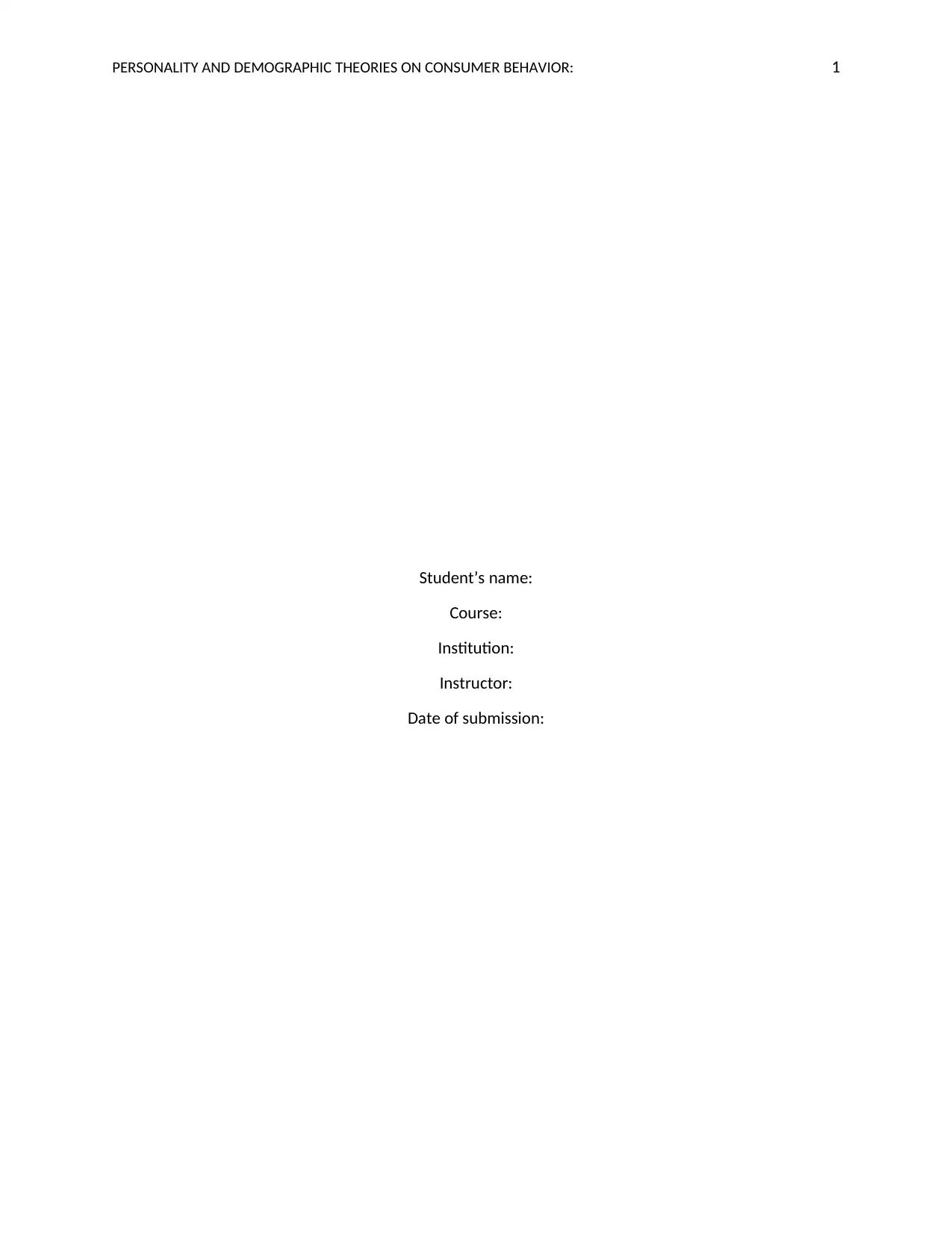
PERSONALITY AND DEMOGRAPHIC THEORIES ON CONSUMER BEHAVIOR: 1
Student’s name:
Course:
Institution:
Instructor:
Date of submission:
Student’s name:
Course:
Institution:
Instructor:
Date of submission:
Paraphrase This Document
Need a fresh take? Get an instant paraphrase of this document with our AI Paraphraser
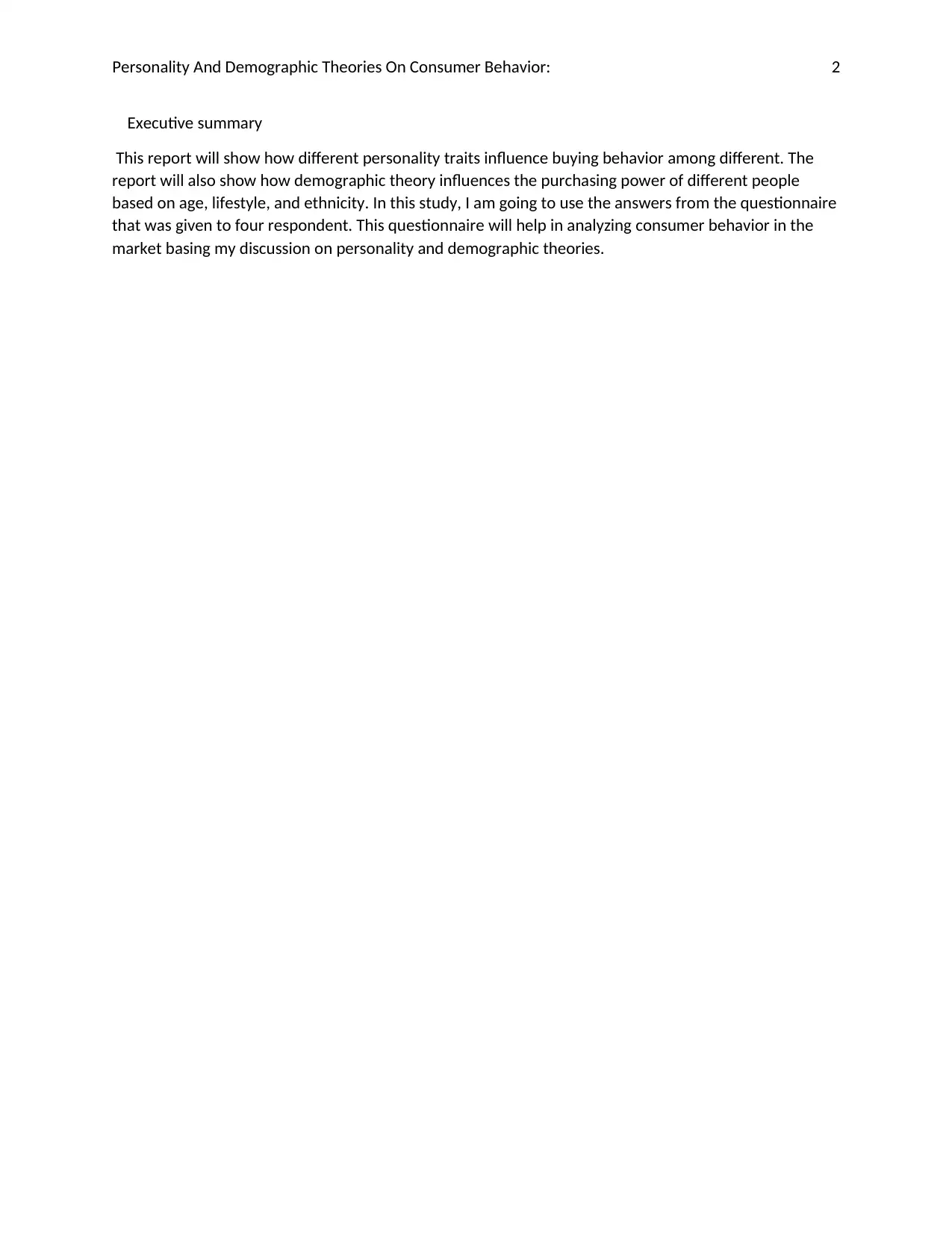
Personality And Demographic Theories On Consumer Behavior: 2
Executive summary
This report will show how different personality traits influence buying behavior among different. The
report will also show how demographic theory influences the purchasing power of different people
based on age, lifestyle, and ethnicity. In this study, I am going to use the answers from the questionnaire
that was given to four respondent. This questionnaire will help in analyzing consumer behavior in the
market basing my discussion on personality and demographic theories.
Executive summary
This report will show how different personality traits influence buying behavior among different. The
report will also show how demographic theory influences the purchasing power of different people
based on age, lifestyle, and ethnicity. In this study, I am going to use the answers from the questionnaire
that was given to four respondent. This questionnaire will help in analyzing consumer behavior in the
market basing my discussion on personality and demographic theories.
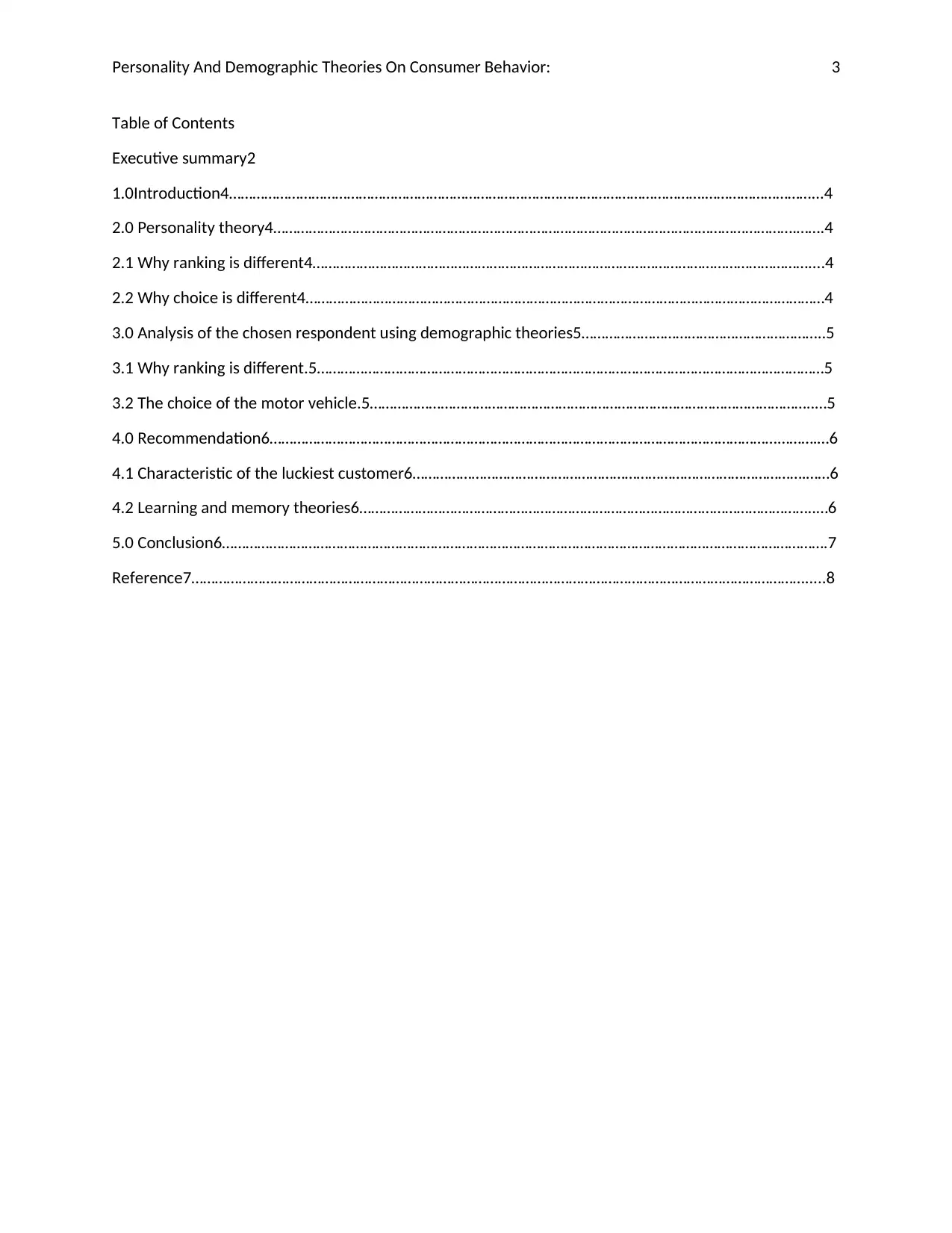
Personality And Demographic Theories On Consumer Behavior: 3
Table of Contents
Executive summary2
1.0Introduction4………………………………………………………………………………………………………….………………………...4
2.0 Personality theory4…………………………………………………………………………………………………………………….…….4
2.1 Why ranking is different4………………………………………………………………………………………………………………....4
2.2 Why choice is different4……………………………………………………………………………………………………………………4
3.0 Analysis of the chosen respondent using demographic theories5……………………………………………………..5
3.1 Why ranking is different.5…………………………………………………………………………………………………………………5
3.2 The choice of the motor vehicle.5…………………………………………………………………………………………………..…5
4.0 Recommendation6………………………………………………………………………………………………………………………….…6
4.1 Characteristic of the luckiest customer6……………………………………………………………………………………….……6
4.2 Learning and memory theories6……………………………………………………………………………………………………..…6
5.0 Conclusion6……………………………………………………………………………………………………………………………………….7
Reference7………………………………………………………………………………………………………………………………………….....8
Table of Contents
Executive summary2
1.0Introduction4………………………………………………………………………………………………………….………………………...4
2.0 Personality theory4…………………………………………………………………………………………………………………….…….4
2.1 Why ranking is different4………………………………………………………………………………………………………………....4
2.2 Why choice is different4……………………………………………………………………………………………………………………4
3.0 Analysis of the chosen respondent using demographic theories5……………………………………………………..5
3.1 Why ranking is different.5…………………………………………………………………………………………………………………5
3.2 The choice of the motor vehicle.5…………………………………………………………………………………………………..…5
4.0 Recommendation6………………………………………………………………………………………………………………………….…6
4.1 Characteristic of the luckiest customer6……………………………………………………………………………………….……6
4.2 Learning and memory theories6……………………………………………………………………………………………………..…6
5.0 Conclusion6……………………………………………………………………………………………………………………………………….7
Reference7………………………………………………………………………………………………………………………………………….....8
⊘ This is a preview!⊘
Do you want full access?
Subscribe today to unlock all pages.

Trusted by 1+ million students worldwide
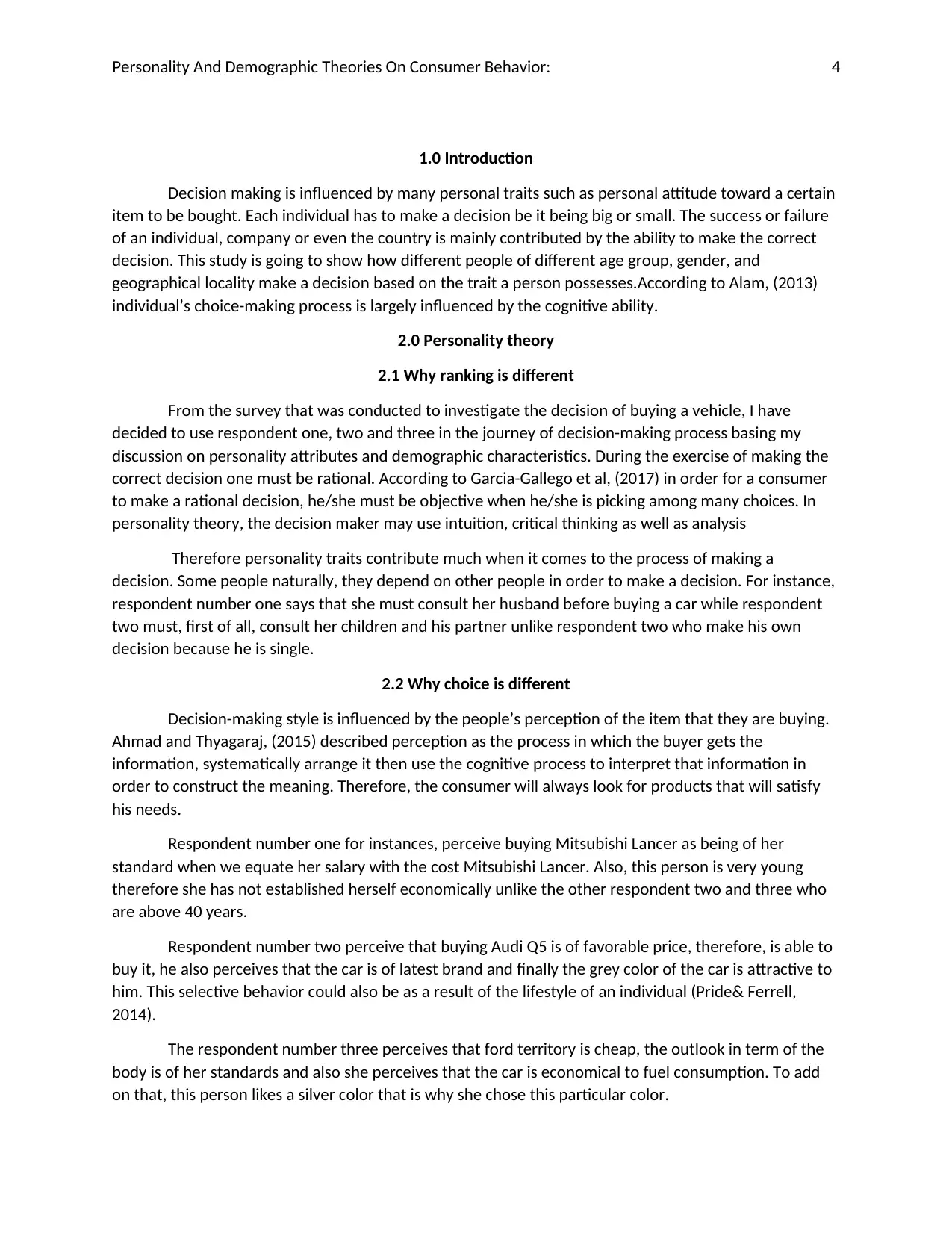
Personality And Demographic Theories On Consumer Behavior: 4
1.0 Introduction
Decision making is influenced by many personal traits such as personal attitude toward a certain
item to be bought. Each individual has to make a decision be it being big or small. The success or failure
of an individual, company or even the country is mainly contributed by the ability to make the correct
decision. This study is going to show how different people of different age group, gender, and
geographical locality make a decision based on the trait a person possesses.According to Alam, (2013)
individual’s choice-making process is largely influenced by the cognitive ability.
2.0 Personality theory
2.1 Why ranking is different
From the survey that was conducted to investigate the decision of buying a vehicle, I have
decided to use respondent one, two and three in the journey of decision-making process basing my
discussion on personality attributes and demographic characteristics. During the exercise of making the
correct decision one must be rational. According to Garcia-Gallego et al, (2017) in order for a consumer
to make a rational decision, he/she must be objective when he/she is picking among many choices. In
personality theory, the decision maker may use intuition, critical thinking as well as analysis
Therefore personality traits contribute much when it comes to the process of making a
decision. Some people naturally, they depend on other people in order to make a decision. For instance,
respondent number one says that she must consult her husband before buying a car while respondent
two must, first of all, consult her children and his partner unlike respondent two who make his own
decision because he is single.
2.2 Why choice is different
Decision-making style is influenced by the people’s perception of the item that they are buying.
Ahmad and Thyagaraj, (2015) described perception as the process in which the buyer gets the
information, systematically arrange it then use the cognitive process to interpret that information in
order to construct the meaning. Therefore, the consumer will always look for products that will satisfy
his needs.
Respondent number one for instances, perceive buying Mitsubishi Lancer as being of her
standard when we equate her salary with the cost Mitsubishi Lancer. Also, this person is very young
therefore she has not established herself economically unlike the other respondent two and three who
are above 40 years.
Respondent number two perceive that buying Audi Q5 is of favorable price, therefore, is able to
buy it, he also perceives that the car is of latest brand and finally the grey color of the car is attractive to
him. This selective behavior could also be as a result of the lifestyle of an individual (Pride& Ferrell,
2014).
The respondent number three perceives that ford territory is cheap, the outlook in term of the
body is of her standards and also she perceives that the car is economical to fuel consumption. To add
on that, this person likes a silver color that is why she chose this particular color.
1.0 Introduction
Decision making is influenced by many personal traits such as personal attitude toward a certain
item to be bought. Each individual has to make a decision be it being big or small. The success or failure
of an individual, company or even the country is mainly contributed by the ability to make the correct
decision. This study is going to show how different people of different age group, gender, and
geographical locality make a decision based on the trait a person possesses.According to Alam, (2013)
individual’s choice-making process is largely influenced by the cognitive ability.
2.0 Personality theory
2.1 Why ranking is different
From the survey that was conducted to investigate the decision of buying a vehicle, I have
decided to use respondent one, two and three in the journey of decision-making process basing my
discussion on personality attributes and demographic characteristics. During the exercise of making the
correct decision one must be rational. According to Garcia-Gallego et al, (2017) in order for a consumer
to make a rational decision, he/she must be objective when he/she is picking among many choices. In
personality theory, the decision maker may use intuition, critical thinking as well as analysis
Therefore personality traits contribute much when it comes to the process of making a
decision. Some people naturally, they depend on other people in order to make a decision. For instance,
respondent number one says that she must consult her husband before buying a car while respondent
two must, first of all, consult her children and his partner unlike respondent two who make his own
decision because he is single.
2.2 Why choice is different
Decision-making style is influenced by the people’s perception of the item that they are buying.
Ahmad and Thyagaraj, (2015) described perception as the process in which the buyer gets the
information, systematically arrange it then use the cognitive process to interpret that information in
order to construct the meaning. Therefore, the consumer will always look for products that will satisfy
his needs.
Respondent number one for instances, perceive buying Mitsubishi Lancer as being of her
standard when we equate her salary with the cost Mitsubishi Lancer. Also, this person is very young
therefore she has not established herself economically unlike the other respondent two and three who
are above 40 years.
Respondent number two perceive that buying Audi Q5 is of favorable price, therefore, is able to
buy it, he also perceives that the car is of latest brand and finally the grey color of the car is attractive to
him. This selective behavior could also be as a result of the lifestyle of an individual (Pride& Ferrell,
2014).
The respondent number three perceives that ford territory is cheap, the outlook in term of the
body is of her standards and also she perceives that the car is economical to fuel consumption. To add
on that, this person likes a silver color that is why she chose this particular color.
Paraphrase This Document
Need a fresh take? Get an instant paraphrase of this document with our AI Paraphraser
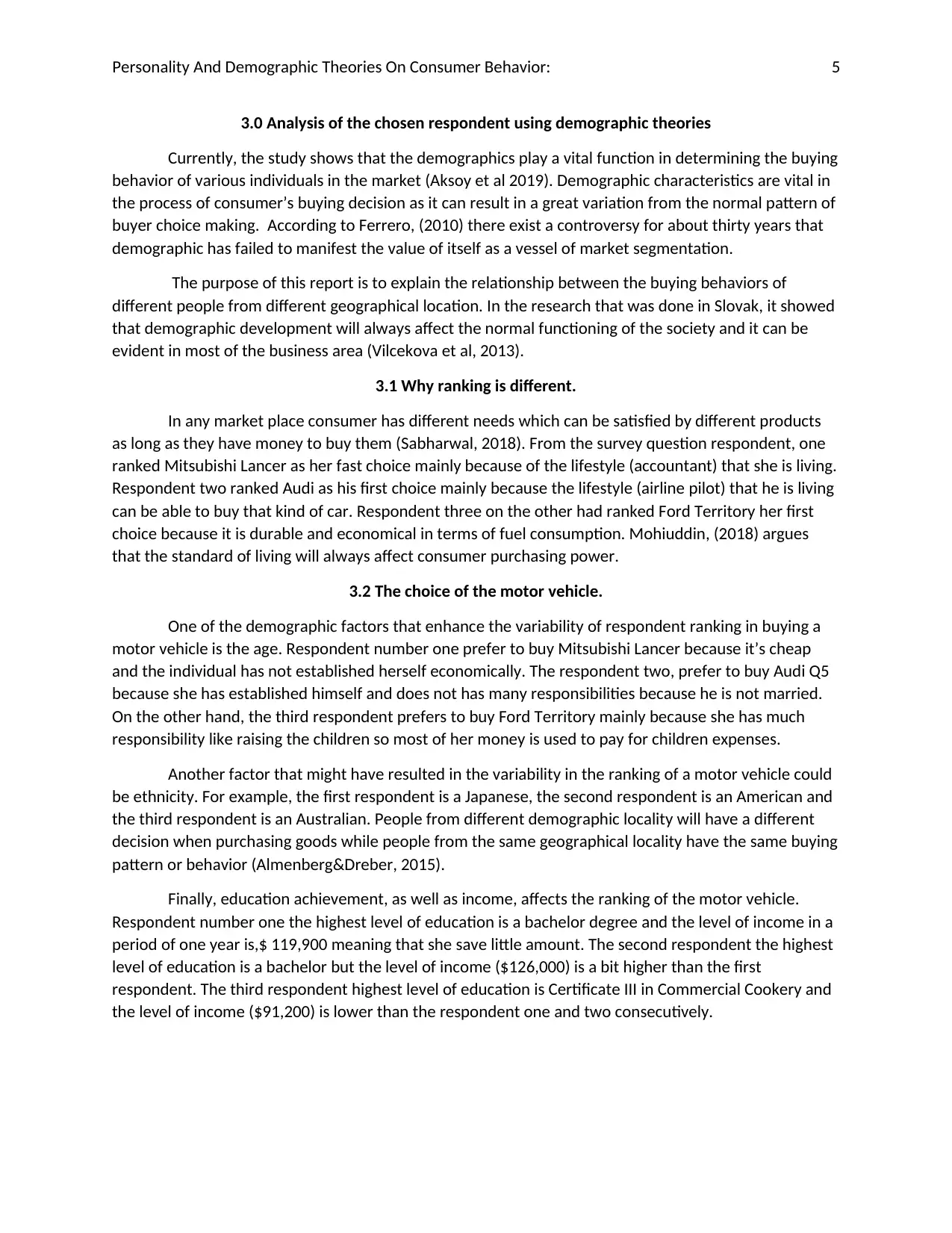
Personality And Demographic Theories On Consumer Behavior: 5
3.0 Analysis of the chosen respondent using demographic theories
Currently, the study shows that the demographics play a vital function in determining the buying
behavior of various individuals in the market (Aksoy et al 2019). Demographic characteristics are vital in
the process of consumer’s buying decision as it can result in a great variation from the normal pattern of
buyer choice making. According to Ferrero, (2010) there exist a controversy for about thirty years that
demographic has failed to manifest the value of itself as a vessel of market segmentation.
The purpose of this report is to explain the relationship between the buying behaviors of
different people from different geographical location. In the research that was done in Slovak, it showed
that demographic development will always affect the normal functioning of the society and it can be
evident in most of the business area (Vilcekova et al, 2013).
3.1 Why ranking is different.
In any market place consumer has different needs which can be satisfied by different products
as long as they have money to buy them (Sabharwal, 2018). From the survey question respondent, one
ranked Mitsubishi Lancer as her fast choice mainly because of the lifestyle (accountant) that she is living.
Respondent two ranked Audi as his first choice mainly because the lifestyle (airline pilot) that he is living
can be able to buy that kind of car. Respondent three on the other had ranked Ford Territory her first
choice because it is durable and economical in terms of fuel consumption. Mohiuddin, (2018) argues
that the standard of living will always affect consumer purchasing power.
3.2 The choice of the motor vehicle.
One of the demographic factors that enhance the variability of respondent ranking in buying a
motor vehicle is the age. Respondent number one prefer to buy Mitsubishi Lancer because it’s cheap
and the individual has not established herself economically. The respondent two, prefer to buy Audi Q5
because she has established himself and does not has many responsibilities because he is not married.
On the other hand, the third respondent prefers to buy Ford Territory mainly because she has much
responsibility like raising the children so most of her money is used to pay for children expenses.
Another factor that might have resulted in the variability in the ranking of a motor vehicle could
be ethnicity. For example, the first respondent is a Japanese, the second respondent is an American and
the third respondent is an Australian. People from different demographic locality will have a different
decision when purchasing goods while people from the same geographical locality have the same buying
pattern or behavior (Almenberg&Dreber, 2015).
Finally, education achievement, as well as income, affects the ranking of the motor vehicle.
Respondent number one the highest level of education is a bachelor degree and the level of income in a
period of one year is,$ 119,900 meaning that she save little amount. The second respondent the highest
level of education is a bachelor but the level of income ($126,000) is a bit higher than the first
respondent. The third respondent highest level of education is Certificate III in Commercial Cookery and
the level of income ($91,200) is lower than the respondent one and two consecutively.
3.0 Analysis of the chosen respondent using demographic theories
Currently, the study shows that the demographics play a vital function in determining the buying
behavior of various individuals in the market (Aksoy et al 2019). Demographic characteristics are vital in
the process of consumer’s buying decision as it can result in a great variation from the normal pattern of
buyer choice making. According to Ferrero, (2010) there exist a controversy for about thirty years that
demographic has failed to manifest the value of itself as a vessel of market segmentation.
The purpose of this report is to explain the relationship between the buying behaviors of
different people from different geographical location. In the research that was done in Slovak, it showed
that demographic development will always affect the normal functioning of the society and it can be
evident in most of the business area (Vilcekova et al, 2013).
3.1 Why ranking is different.
In any market place consumer has different needs which can be satisfied by different products
as long as they have money to buy them (Sabharwal, 2018). From the survey question respondent, one
ranked Mitsubishi Lancer as her fast choice mainly because of the lifestyle (accountant) that she is living.
Respondent two ranked Audi as his first choice mainly because the lifestyle (airline pilot) that he is living
can be able to buy that kind of car. Respondent three on the other had ranked Ford Territory her first
choice because it is durable and economical in terms of fuel consumption. Mohiuddin, (2018) argues
that the standard of living will always affect consumer purchasing power.
3.2 The choice of the motor vehicle.
One of the demographic factors that enhance the variability of respondent ranking in buying a
motor vehicle is the age. Respondent number one prefer to buy Mitsubishi Lancer because it’s cheap
and the individual has not established herself economically. The respondent two, prefer to buy Audi Q5
because she has established himself and does not has many responsibilities because he is not married.
On the other hand, the third respondent prefers to buy Ford Territory mainly because she has much
responsibility like raising the children so most of her money is used to pay for children expenses.
Another factor that might have resulted in the variability in the ranking of a motor vehicle could
be ethnicity. For example, the first respondent is a Japanese, the second respondent is an American and
the third respondent is an Australian. People from different demographic locality will have a different
decision when purchasing goods while people from the same geographical locality have the same buying
pattern or behavior (Almenberg&Dreber, 2015).
Finally, education achievement, as well as income, affects the ranking of the motor vehicle.
Respondent number one the highest level of education is a bachelor degree and the level of income in a
period of one year is,$ 119,900 meaning that she save little amount. The second respondent the highest
level of education is a bachelor but the level of income ($126,000) is a bit higher than the first
respondent. The third respondent highest level of education is Certificate III in Commercial Cookery and
the level of income ($91,200) is lower than the respondent one and two consecutively.
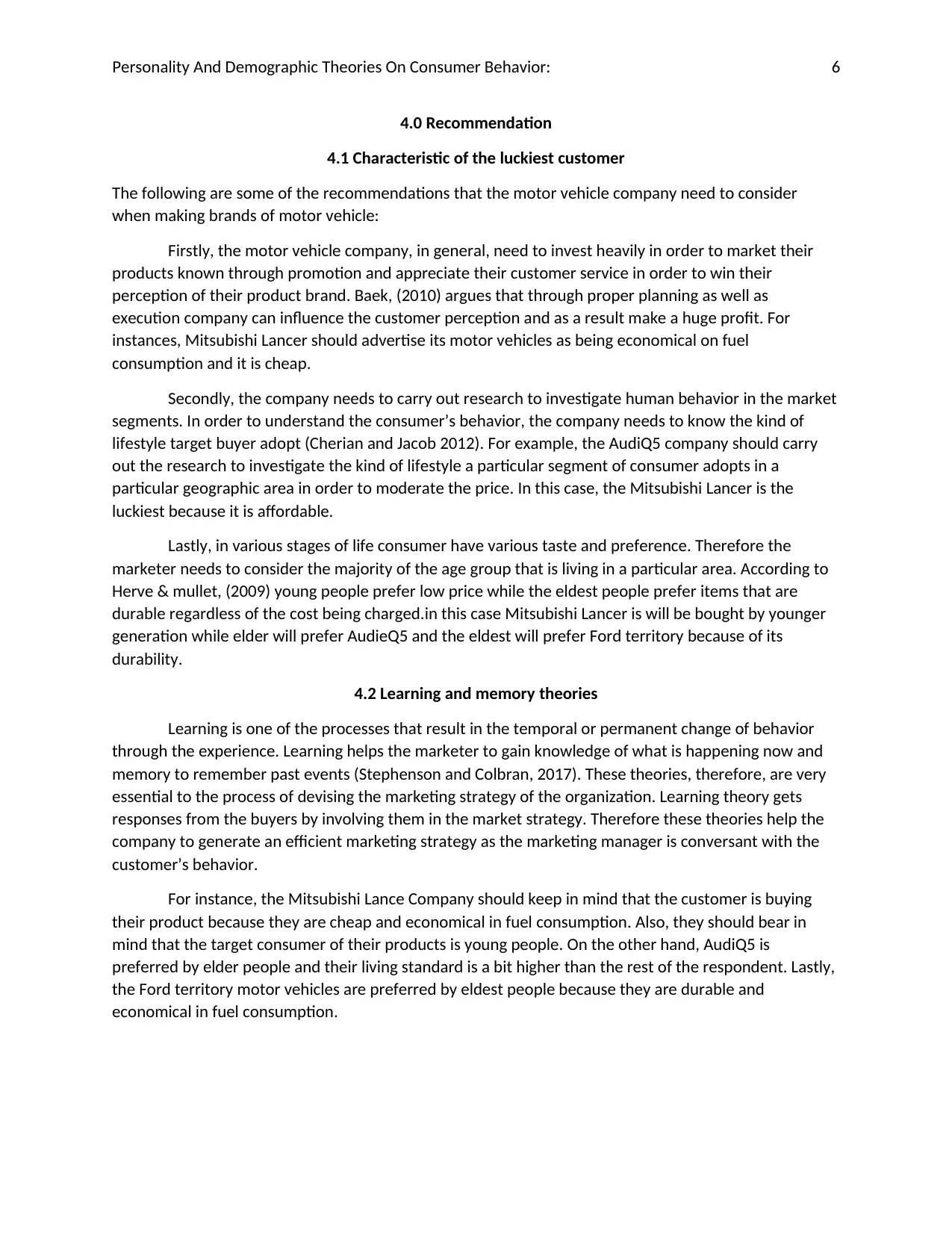
Personality And Demographic Theories On Consumer Behavior: 6
4.0 Recommendation
4.1 Characteristic of the luckiest customer
The following are some of the recommendations that the motor vehicle company need to consider
when making brands of motor vehicle:
Firstly, the motor vehicle company, in general, need to invest heavily in order to market their
products known through promotion and appreciate their customer service in order to win their
perception of their product brand. Baek, (2010) argues that through proper planning as well as
execution company can influence the customer perception and as a result make a huge profit. For
instances, Mitsubishi Lancer should advertise its motor vehicles as being economical on fuel
consumption and it is cheap.
Secondly, the company needs to carry out research to investigate human behavior in the market
segments. In order to understand the consumer’s behavior, the company needs to know the kind of
lifestyle target buyer adopt (Cherian and Jacob 2012). For example, the AudiQ5 company should carry
out the research to investigate the kind of lifestyle a particular segment of consumer adopts in a
particular geographic area in order to moderate the price. In this case, the Mitsubishi Lancer is the
luckiest because it is affordable.
Lastly, in various stages of life consumer have various taste and preference. Therefore the
marketer needs to consider the majority of the age group that is living in a particular area. According to
Herve & mullet, (2009) young people prefer low price while the eldest people prefer items that are
durable regardless of the cost being charged.in this case Mitsubishi Lancer is will be bought by younger
generation while elder will prefer AudieQ5 and the eldest will prefer Ford territory because of its
durability.
4.2 Learning and memory theories
Learning is one of the processes that result in the temporal or permanent change of behavior
through the experience. Learning helps the marketer to gain knowledge of what is happening now and
memory to remember past events (Stephenson and Colbran, 2017). These theories, therefore, are very
essential to the process of devising the marketing strategy of the organization. Learning theory gets
responses from the buyers by involving them in the market strategy. Therefore these theories help the
company to generate an efficient marketing strategy as the marketing manager is conversant with the
customer’s behavior.
For instance, the Mitsubishi Lance Company should keep in mind that the customer is buying
their product because they are cheap and economical in fuel consumption. Also, they should bear in
mind that the target consumer of their products is young people. On the other hand, AudiQ5 is
preferred by elder people and their living standard is a bit higher than the rest of the respondent. Lastly,
the Ford territory motor vehicles are preferred by eldest people because they are durable and
economical in fuel consumption.
4.0 Recommendation
4.1 Characteristic of the luckiest customer
The following are some of the recommendations that the motor vehicle company need to consider
when making brands of motor vehicle:
Firstly, the motor vehicle company, in general, need to invest heavily in order to market their
products known through promotion and appreciate their customer service in order to win their
perception of their product brand. Baek, (2010) argues that through proper planning as well as
execution company can influence the customer perception and as a result make a huge profit. For
instances, Mitsubishi Lancer should advertise its motor vehicles as being economical on fuel
consumption and it is cheap.
Secondly, the company needs to carry out research to investigate human behavior in the market
segments. In order to understand the consumer’s behavior, the company needs to know the kind of
lifestyle target buyer adopt (Cherian and Jacob 2012). For example, the AudiQ5 company should carry
out the research to investigate the kind of lifestyle a particular segment of consumer adopts in a
particular geographic area in order to moderate the price. In this case, the Mitsubishi Lancer is the
luckiest because it is affordable.
Lastly, in various stages of life consumer have various taste and preference. Therefore the
marketer needs to consider the majority of the age group that is living in a particular area. According to
Herve & mullet, (2009) young people prefer low price while the eldest people prefer items that are
durable regardless of the cost being charged.in this case Mitsubishi Lancer is will be bought by younger
generation while elder will prefer AudieQ5 and the eldest will prefer Ford territory because of its
durability.
4.2 Learning and memory theories
Learning is one of the processes that result in the temporal or permanent change of behavior
through the experience. Learning helps the marketer to gain knowledge of what is happening now and
memory to remember past events (Stephenson and Colbran, 2017). These theories, therefore, are very
essential to the process of devising the marketing strategy of the organization. Learning theory gets
responses from the buyers by involving them in the market strategy. Therefore these theories help the
company to generate an efficient marketing strategy as the marketing manager is conversant with the
customer’s behavior.
For instance, the Mitsubishi Lance Company should keep in mind that the customer is buying
their product because they are cheap and economical in fuel consumption. Also, they should bear in
mind that the target consumer of their products is young people. On the other hand, AudiQ5 is
preferred by elder people and their living standard is a bit higher than the rest of the respondent. Lastly,
the Ford territory motor vehicles are preferred by eldest people because they are durable and
economical in fuel consumption.
⊘ This is a preview!⊘
Do you want full access?
Subscribe today to unlock all pages.

Trusted by 1+ million students worldwide
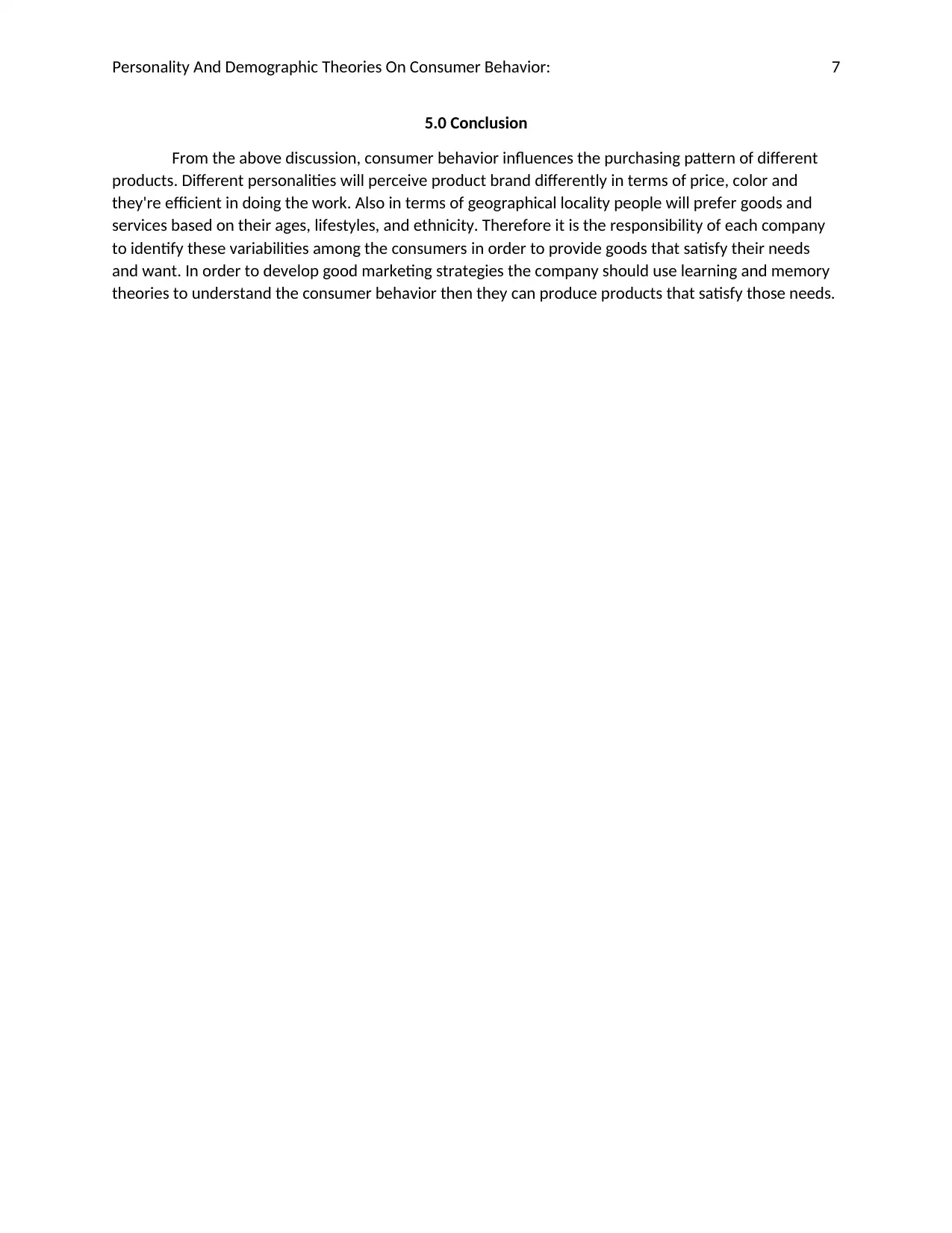
Personality And Demographic Theories On Consumer Behavior: 7
5.0 Conclusion
From the above discussion, consumer behavior influences the purchasing pattern of different
products. Different personalities will perceive product brand differently in terms of price, color and
they're efficient in doing the work. Also in terms of geographical locality people will prefer goods and
services based on their ages, lifestyles, and ethnicity. Therefore it is the responsibility of each company
to identify these variabilities among the consumers in order to provide goods that satisfy their needs
and want. In order to develop good marketing strategies the company should use learning and memory
theories to understand the consumer behavior then they can produce products that satisfy those needs.
5.0 Conclusion
From the above discussion, consumer behavior influences the purchasing pattern of different
products. Different personalities will perceive product brand differently in terms of price, color and
they're efficient in doing the work. Also in terms of geographical locality people will prefer goods and
services based on their ages, lifestyles, and ethnicity. Therefore it is the responsibility of each company
to identify these variabilities among the consumers in order to provide goods that satisfy their needs
and want. In order to develop good marketing strategies the company should use learning and memory
theories to understand the consumer behavior then they can produce products that satisfy those needs.
Paraphrase This Document
Need a fresh take? Get an instant paraphrase of this document with our AI Paraphraser
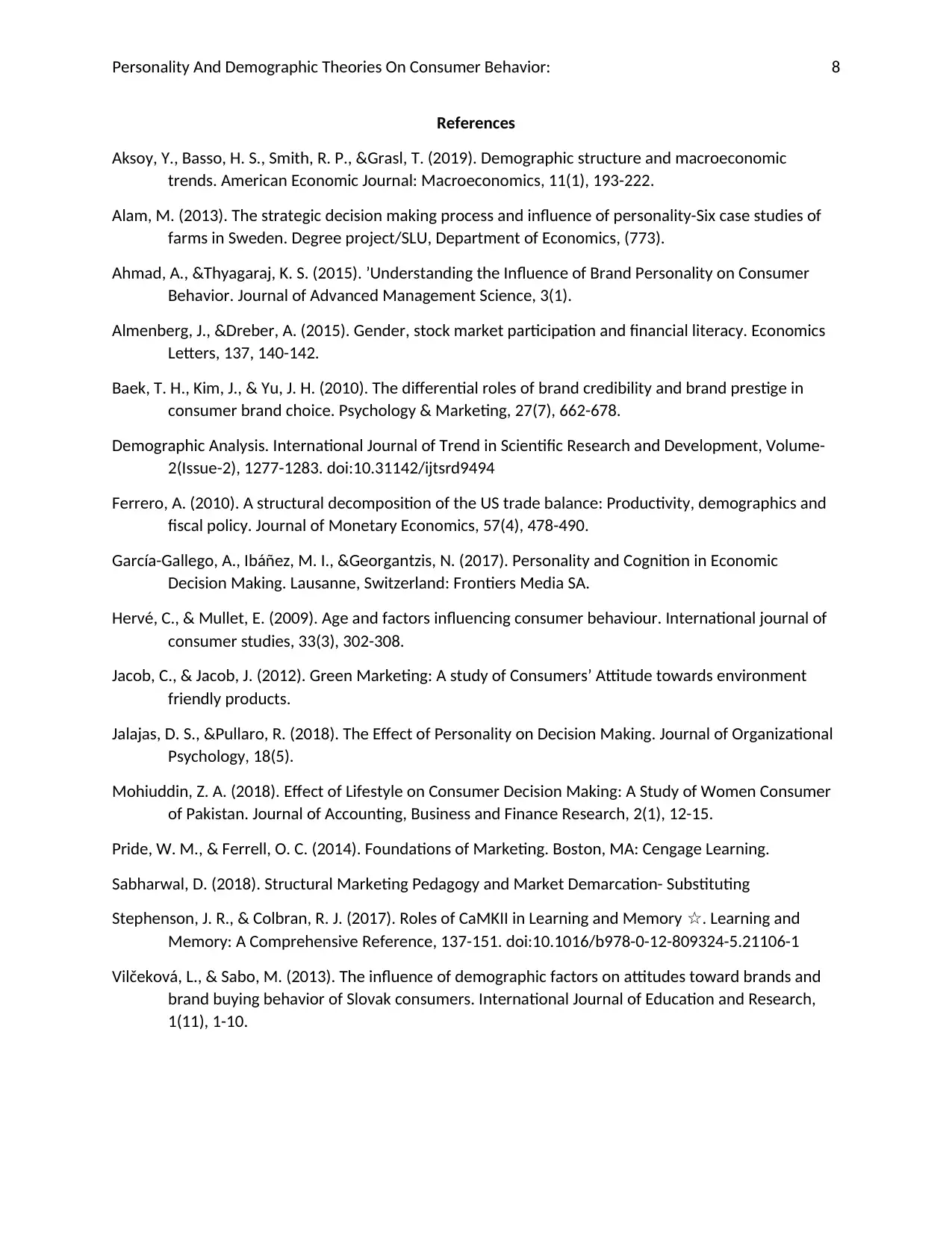
Personality And Demographic Theories On Consumer Behavior: 8
References
Aksoy, Y., Basso, H. S., Smith, R. P., &Grasl, T. (2019). Demographic structure and macroeconomic
trends. American Economic Journal: Macroeconomics, 11(1), 193-222.
Alam, M. (2013). The strategic decision making process and influence of personality-Six case studies of
farms in Sweden. Degree project/SLU, Department of Economics, (773).
Ahmad, A., &Thyagaraj, K. S. (2015). ’Understanding the Influence of Brand Personality on Consumer
Behavior. Journal of Advanced Management Science, 3(1).
Almenberg, J., &Dreber, A. (2015). Gender, stock market participation and financial literacy. Economics
Letters, 137, 140-142.
Baek, T. H., Kim, J., & Yu, J. H. (2010). The differential roles of brand credibility and brand prestige in
consumer brand choice. Psychology & Marketing, 27(7), 662-678.
Demographic Analysis. International Journal of Trend in Scientific Research and Development, Volume-
2(Issue-2), 1277-1283. doi:10.31142/ijtsrd9494
Ferrero, A. (2010). A structural decomposition of the US trade balance: Productivity, demographics and
fiscal policy. Journal of Monetary Economics, 57(4), 478-490.
García-Gallego, A., Ibáñez, M. I., &Georgantzis, N. (2017). Personality and Cognition in Economic
Decision Making. Lausanne, Switzerland: Frontiers Media SA.
Hervé, C., & Mullet, E. (2009). Age and factors influencing consumer behaviour. International journal of
consumer studies, 33(3), 302-308.
Jacob, C., & Jacob, J. (2012). Green Marketing: A study of Consumers’ Attitude towards environment
friendly products.
Jalajas, D. S., &Pullaro, R. (2018). The Effect of Personality on Decision Making. Journal of Organizational
Psychology, 18(5).
Mohiuddin, Z. A. (2018). Effect of Lifestyle on Consumer Decision Making: A Study of Women Consumer
of Pakistan. Journal of Accounting, Business and Finance Research, 2(1), 12-15.
Pride, W. M., & Ferrell, O. C. (2014). Foundations of Marketing. Boston, MA: Cengage Learning.
Sabharwal, D. (2018). Structural Marketing Pedagogy and Market Demarcation- Substituting
Stephenson, J. R., & Colbran, R. J. (2017). Roles of CaMKII in Learning and Memory ☆. Learning and
Memory: A Comprehensive Reference, 137-151. doi:10.1016/b978-0-12-809324-5.21106-1
Vilčeková, L., & Sabo, M. (2013). The influence of demographic factors on attitudes toward brands and
brand buying behavior of Slovak consumers. International Journal of Education and Research,
1(11), 1-10.
References
Aksoy, Y., Basso, H. S., Smith, R. P., &Grasl, T. (2019). Demographic structure and macroeconomic
trends. American Economic Journal: Macroeconomics, 11(1), 193-222.
Alam, M. (2013). The strategic decision making process and influence of personality-Six case studies of
farms in Sweden. Degree project/SLU, Department of Economics, (773).
Ahmad, A., &Thyagaraj, K. S. (2015). ’Understanding the Influence of Brand Personality on Consumer
Behavior. Journal of Advanced Management Science, 3(1).
Almenberg, J., &Dreber, A. (2015). Gender, stock market participation and financial literacy. Economics
Letters, 137, 140-142.
Baek, T. H., Kim, J., & Yu, J. H. (2010). The differential roles of brand credibility and brand prestige in
consumer brand choice. Psychology & Marketing, 27(7), 662-678.
Demographic Analysis. International Journal of Trend in Scientific Research and Development, Volume-
2(Issue-2), 1277-1283. doi:10.31142/ijtsrd9494
Ferrero, A. (2010). A structural decomposition of the US trade balance: Productivity, demographics and
fiscal policy. Journal of Monetary Economics, 57(4), 478-490.
García-Gallego, A., Ibáñez, M. I., &Georgantzis, N. (2017). Personality and Cognition in Economic
Decision Making. Lausanne, Switzerland: Frontiers Media SA.
Hervé, C., & Mullet, E. (2009). Age and factors influencing consumer behaviour. International journal of
consumer studies, 33(3), 302-308.
Jacob, C., & Jacob, J. (2012). Green Marketing: A study of Consumers’ Attitude towards environment
friendly products.
Jalajas, D. S., &Pullaro, R. (2018). The Effect of Personality on Decision Making. Journal of Organizational
Psychology, 18(5).
Mohiuddin, Z. A. (2018). Effect of Lifestyle on Consumer Decision Making: A Study of Women Consumer
of Pakistan. Journal of Accounting, Business and Finance Research, 2(1), 12-15.
Pride, W. M., & Ferrell, O. C. (2014). Foundations of Marketing. Boston, MA: Cengage Learning.
Sabharwal, D. (2018). Structural Marketing Pedagogy and Market Demarcation- Substituting
Stephenson, J. R., & Colbran, R. J. (2017). Roles of CaMKII in Learning and Memory ☆. Learning and
Memory: A Comprehensive Reference, 137-151. doi:10.1016/b978-0-12-809324-5.21106-1
Vilčeková, L., & Sabo, M. (2013). The influence of demographic factors on attitudes toward brands and
brand buying behavior of Slovak consumers. International Journal of Education and Research,
1(11), 1-10.
1 out of 8
Related Documents
Your All-in-One AI-Powered Toolkit for Academic Success.
+13062052269
info@desklib.com
Available 24*7 on WhatsApp / Email
![[object Object]](/_next/static/media/star-bottom.7253800d.svg)
Unlock your academic potential
Copyright © 2020–2026 A2Z Services. All Rights Reserved. Developed and managed by ZUCOL.




